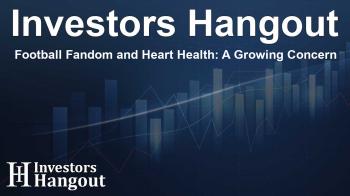Football Fandom and Heart Health: A Growing Concern

Football Fandom and Heart Health: A Growing Concern
Recent research indicates that many Americans devoted to football may unintentionally jeopardize their heart health. A study conducted by YouGov reveals that a significant percentage of American football fans would think twice before seeking medical attention if they experienced symptoms of a heart attack during a game.
The survey showcases that around 21% of Americans would hesitate to leave a professional sporting event for ER visits related to suspected heart issues. Particularly concerning is the statistic showing that 28% of football fans would delay seeking help, contrasting sharply with the 19% of fans who have already faced cardiac symptoms and still hesitate.
General Attitudes Towards Heart Health
This nationwide survey, including over 1,000 adults, aimed to understand how Americans feel about heart attack risks and their willingness to seek help. The results are telling. More than half of those surveyed—54%—reported having personal experiences either with heart attack suspicions or know someone who has.
When asked about their concerns, 49% expressed worries about a family member suffering a heart attack. Meanwhile, 35% indicated they were anxious about their own heart health. Despite these concerns, many avid football fans seem to overlook the gravity of the situation when it comes to attending games.
Importance of Recognizing Heart Attack Symptoms
Experts emphasize the importance of recognizing early symptoms of heart attacks. Ian Lentnek, MD, a cardiologist at Siemens Healthineers, highlighted that timely action can significantly minimize heart damage and improve outcomes. A heart attack can start causing irreversible damage in less than an hour, thus immediate medical attention is crucial if any symptoms arise.
With many fans willing to ignore these symptoms, it's essential to raise awareness and highlight the importance of seeking help. The societal tendency to prioritize sports events over health emergencies can have dire consequences.
Demand for Health Risk Information
The survey further reveals a growing desire among Americans for more information regarding their personal risks of heart attacks. Approximately 67% expressed interest in understanding their risk levels better. This eagerness may reflect a growing recognition that knowledge leads to proactive health management. In fact, 75% indicated they would alter their lifestyles to lower their heart attack risk if provided with relevant information.
Innovations in Cardiac Risk Assessment
Recent advancements in medical technology, particularly by Siemens Healthineers, offer solutions that empower patients with valuable insights into their heart health. The Atellica IM High-Sensitivity Troponin I (TnIH) test can forecast one’s risk of a major cardiac event over the next year. This groundbreaking test not only serves patients potentially experiencing heart attacks but also helps monitor those who are not having immediate issues.
Dr. Lentnek mentions that having access to predictive risk assessments can guide patients' decisions, encouraging them to act if they notice concerning signs such as chest pain or difficulty breathing.
Siemens Healthineers: A Commitment to Better Healthcare
Siemens Healthineers stands as a leading entity in healthcare advancements, focusing on enhancing access to medical resources and solutions across the globe. By operating in over 180 countries and employing roughly 72,000 people, the company aims to tackle major health challenges with innovative technologies and services. Their work not only centers on diagnostics and treatment but also on educating the public about health risks and promoting proactive health measures.
As the landscape of healthcare evolves, initiatives like the survey conducted by Siemens Healthineers play a vital role in shining a light on pressing health issues. Awareness is the first step, and helping individuals understand their heart health is crucial for overall wellbeing.
Frequently Asked Questions
What did the survey reveal about Americans and heart attacks?
The survey found that many Americans, particularly football fans, would hesitate to seek medical help if experiencing heart attack symptoms during events.
How many Americans are concerned about heart attack risks?
49% of respondents expressed concern about a family member suffering a heart attack, while 35% worried about their own risk.
What percentage of respondents want more heart health information?
Approximately 67% of Americans indicated they want to learn about their risk of heart attacks.
What innovation aids patients in assessing heart health risks?
The Atellica IM High-Sensitivity Troponin I (TnIH) test developed by Siemens Healthineers helps evaluate heart attack risks and is a groundbreaking advancement in cardiac assessment.
Why is seeking immediate attention during heart attack symptoms important?
Timely medical intervention can minimize heart damage and enhance survival rates, with significant damage potentially occurring within an hour of symptom onset.
About The Author
Contact Owen Jenkins privately here. Or send an email with ATTN: Owen Jenkins as the subject to contact@investorshangout.com.
About Investors Hangout
Investors Hangout is a leading online stock forum for financial discussion and learning, offering a wide range of free tools and resources. It draws in traders of all levels, who exchange market knowledge, investigate trading tactics, and keep an eye on industry developments in real time. Featuring financial articles, stock message boards, quotes, charts, company profiles, and live news updates. Through cooperative learning and a wealth of informational resources, it helps users from novices creating their first portfolios to experts honing their techniques. Join Investors Hangout today: https://investorshangout.com/
The content of this article is based on factual, publicly available information and does not represent legal, financial, or investment advice. Investors Hangout does not offer financial advice, and the author is not a licensed financial advisor. Consult a qualified advisor before making any financial or investment decisions based on this article. This article should not be considered advice to purchase, sell, or hold any securities or other investments. If any of the material provided here is inaccurate, please contact us for corrections.

